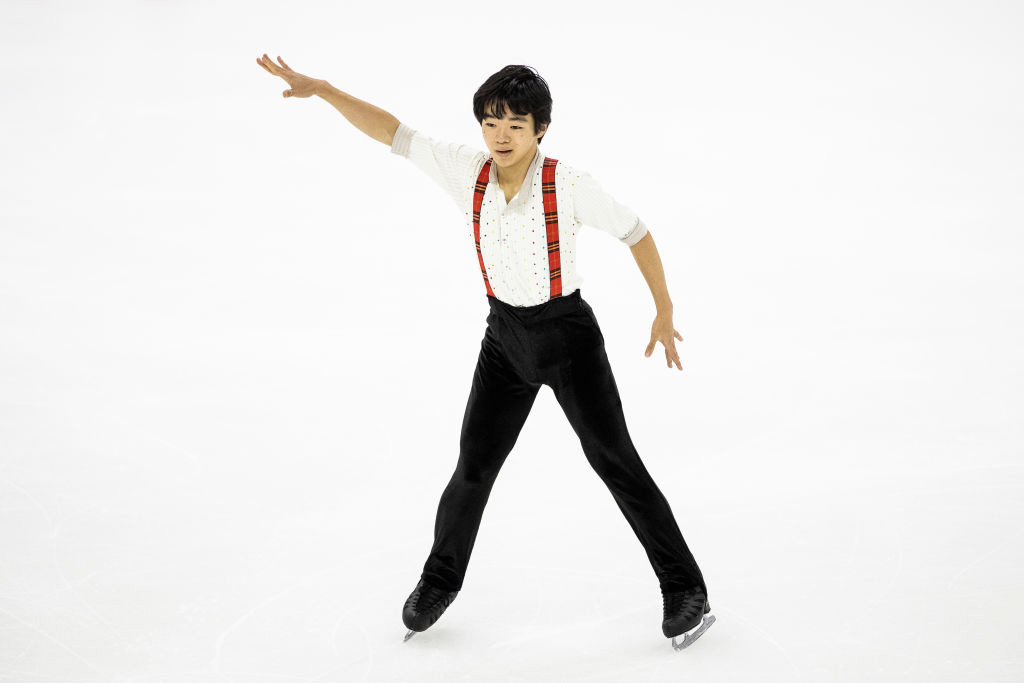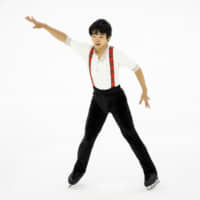Yuma Kagiyama opened the Junior Grand Prix season with a bang.
The 16-year-old put on a dominant performance in winning the JGP in Courchevel, France, on Saturday by a huge margin.
The victory was Kagiyama's first on the JGP circuit, but what resonated was the manner in which he triumphed. Looking both confident and polished, he towered over his competition.
The son of two-time Olympian Masakazu Kagiyama led by 10 points after the short program, then expanded on that by topping the podium with a win by more than 34 points.
More importantly, with 2½ years still to go, Yuma Kagiyama's impressive showing has installed him as a legitimate contender for Japan's team for the 2022 Beijing Olympics.
Yuzuru Hanyu, Shoma Uno and Kagiyama would comprise a formidable squad for the Hinomaru. If Kagiyama's skating continues to blossom, that could well be the trio that makes the trip to China.
Kagiyama's winning total score was 234.87 points, with Canada's Aleksa Rakic (200.71) taking second, and Russia's Andrei Kutovoi (198.06) coming in third.
Kagiyama's short program to "Fate" really impressed announcer Ted Barton.
"Wow. Just fabulous," Barton stated. "I've never seen such soft, beautiful knees on the landings. Just picture perfect on the landing of the triple axel. The quick checkout — absorbing the height and power of the jump into your leg, ankle, knee, hip as you ride that edge. Just beautiful."
Barton then mentioned an interesting comparison.
"Quality skater all the way around. Reminds me a little bit of Shoma Uno with his power and range of movement," Barton commented. "More work to do on expression, but a bright future indeed."
Kagiyama stepped it up in his free skate to the soundtrack from the movie "Tucker."
He opened with a quadruple toe loop/double toe loop combination jump, and went on to add another beautiful quad toe loop that one judged awarded a +5 grade of execution. He also received level fours on all of his spins.
He did receive an edge call on his triple lutz late in the program and earned a level three for his step sequence, showing that he still has room for improvement.
Once again, Barton was effusive in his praise of Kagiyama after the free skate.
"That was fun. That was fantastic. That was phenomenal," Barton said. "That is as fine a performance as we have seen in the junior men's for quite some time."
Barton cited Kagiyama's program content and attitude for recognition.
"Two quads, triple axel, loaded with technical ability," Barton remarked. "But also has a fun approach to his skating. He's powerful. He's quick. Great ice coverage."
Barton concluded his comments by saying fans could be witnessing the start of a new era.
"Simply remarkable. I think you are witnessing the start of a new Japanese skating star," Barton stated. "The fans will follow this young man for many years to come. With all that content, that could compete with some of the seniors."
Skating legend Dick Button offered his view to Ice Time after watching Kagiyama's free skate.
"He is a magnificent jumper with speed and good spinning ability," Button wrote in an email on Monday.
Kagiyama was concise with his own analysis of how he has gotten better in the last year.
"My quad jumps, my expression to the music and my dancing are improved from last season," Kagiyama stated after his victory on Saturday.
Araki just misses podium
The results were disappointing on the women's side in France, with Nana Araki (175.13) placing fourth and Tomoe Kawabata (171.67) fifth.
Two of Russian master coach Eteri Tutberidze's skaters made the podium in Courchevel. Kamila Valieva, a 13-year-old from Kazan, won with a tally of 200.71 in her JGP debut, while teammate Maiia Khromykh (179.32) finished third.
Despite not earning a medal, Barton liked what he saw in Araki's short program to "Destino."
"It's really remarkable the speed with which Nana skates and carries into her elements," Barton noted. "Higher risk with such great speed. When she nails those jumps, they are just huge.
"(She has) great skating skills, good jumping skills, pretty good spinning skills," Barton added. "She needs a bit of work perhaps in the expression department. That will come in time."
Barton also noted a need for more expression in Araki's free skate to "Nausicaa."
"It was only in her steps at the end of her program that she broke out of her shell and started to perform," Barton commented. "I can understand that, because she has a lot of difficult elements to focus and concentrate on. But in the beautiful Japanese tradition, as they move to seniors, they really learn to perform."
Kawabata fifth again
Kawabata's result marked the third straight JGP in which she has finished fifth.
She clearly has great potential, but at some point, that has to be converted into results. Her chance at making the JGP Final this season is likely gone now.
Barton tried to focus on the positives while reviewing her short program to "The Blue Danube."
"She is a spectacular skater. Picks up speed and momentum within two or three strokes, covers the ice, is a big jumper and a wonderful spinner," Barton commented. "Has a beautiful feel and comfort skating to the music."
Barton then added a caveat to his analysis.
"She makes little mistakes and those are very costly," Barton said. "It happened last year."
Lake Placid up next
The JGP moves to Lake Placid, New York, this week for the second stop on the seven-event circuit.
Shun Sato, Mana Kawabe and Azusa Tanaka will represent Japan in their JGP debuts at the competition.
Many people will be focused on Alysa Liu, the U.S. senior champion last season at the age of 13, who will be skating in her first JGP. Liu became the first U.S. women to land a quad lutz over the weekend at the Aurora Games in Albany, New York.
Hosoda wows U.S. crowd
Triple axel specialist Ayaka Hosoda jetted to the United States on Saturday and put on a fine show at the inaugural Aurora Games the very same day.
The 24-year-old performed her free skate to "Gershwin's Concerto in F" as part of the World Team and landed two triple axels in another strong showing.
What followed online was even more interesting. A number of fans asked the very legitimate question: Why doesn't Hosoda have at least a Challenger Series assignment for the upcoming season?
After finishing eighth at last season's Japan nationals, and then being selected as a Team Japan member in April, it seemed inevitable that Hosoda would receive a sought-after international assignment.
However, it has never materialized. It is pretty obvious that there is more at work here than results. Politics is the word that comes to mind.
How else can you explain Marin Honda, who was 15th at nationals last season and had a poor GP season, receiving two international assignments (Nebelhorn Trophy, Cup of China) for the coming campaign and Hosoda not even one?
Ice Time believes the answer lies in Honda's list of prominent sponsors. The Japan Skating Federation wants to keep them happy, despite her results.
This makes Hosoda collateral damage.
Brian Boitano, the 1988 Olympic champion, marveled at Hosoda's effort at the Aurora Games while analyzing the competition for ESPN.
"Are there really seven girls better than her in Japan?" Boitano wondered.
Richaud documentary
On Saturday an impressive documentary was released on YouTube by MK Blades.
"Benoit Richaud — A Choreographer's Mind" is a look at the rising star's personal story and philosophy when it comes to creating programs for his prominent list of skaters.
Skating fans will certainly enjoy this 25-minute film on the young master, whose clients include Kaori Sakamoto, Satoko Miyahara, Daisuke Takahashi and Yuna Shiraiwa.
There were several memorable quotes by Richaud in the compelling piece:
✹ "I'm trying to develop as much as possible the artistic side of my sport."
✹ "The important part of the program is the real subject of the feeling that you want to give to people."
✹ "I'm a pure, organic person in my work. There is nothing planned. If I plan, it is a disaster. If I start to think, I cannot create."
✹ "I do a lot of improvisation with my skaters. I think it's something really important because I need to understand how they feel the musicality."
✹ "We don't have a lot of space in our life for freedom. When I do that (choreograph), I am completely free."
Bradie Tennell, the 2018 U.S. champion, was interviewed and spoke of her collaboration with Richaud.
"I really enjoyed working with him because I felt he had a style that I had never seen before and that's what I really needed to kind of spice up my skating," Tennell stated.
"He pushes you to your limit, and depending on the day, it can be very fun because he makes it fun. He is the kind of person who challenges you and you want to do better for him.
"He makes everything seem attainable," Tennell added.
Tennell's coach Denise Myers also appeared in the documentary.
"I definitely see him pushing the envelope and trying to make the athletes step out of their box and their comfort zone and do things in a different way than they have been used to, and that's important," the coach said of Richaud.




















With your current subscription plan you can comment on stories. However, before writing your first comment, please create a display name in the Profile section of your subscriber account page.